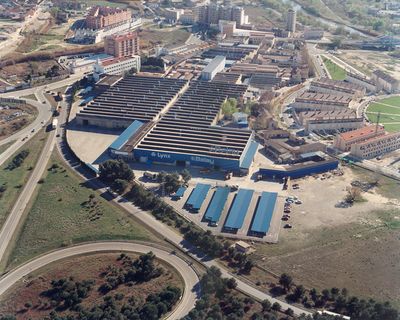Balay
In 1947, entrepreneurs Esteban Bayona and José Maria Lairla founded a company to produce electrical appliances in the Spanish city of Zaragoza. The company name was coined from their surnames – Bayona and Lairla – to become Balay. Powered on by quick success and the boom in the home appliance market, the company began to produce electric cookers and washing machines in the 1950s.[1] Strong sales allowed the company to move to a new 3,000 m2 factory building in the rural district of Montañana, located north of Zaragoza, in 1956. A second factory followed in 1979 in La Cartuja on the outskirts of Zaragoza. Balay continued to grow and by the early 1980s was one of the leading companies in the sector in Spain.
As a consequence of the economic crisis and saturation of the domestic market, employment fell by almost 50 percent in the Spanish home appliance sector between the years of 1980 and 1987. Thanks to restructuring measures, Balay was nationalized in 1980 and merged with the home appliance manufacturer Safel to form the Safel-Balay Group. Once the Spanish home appliance market had stabilized, the Spanish Government decided to reprivatize the Group at the end of 1988.
BSH offered a way out of the crisis
BSH[2] CEO, Dr. Herbert Wörner, delivered the opening address at the BSH company conference in Munich in June 1989, where he outlined the strategy for the coming 1990s: "...to develop BSHG from a company with a heavy bias on the home market (...) to a true European white goods producer." The majority stake in Balay and Safel in December 1988 represented a significant step already toward achieving this objective. BSH thus acquired the 24 percent market share held by the two Spanish manufacturers in their home country. At a European level, a market share of 12 percent was achieved, thus making BSH the second largest manufacturer of home appliances.[3]
Expertise in induction technology
Owing to the high saturation rates in the traditional product areas, the home appliance business at the beginning of the 1990s was primarily characterized by the need for spare parts. Innovation was required to stand out from the competition. The know-how in induction technology offered by the Spaniards was therefore especially interesting for BSH. The region around Zaragoza was regarded as the Silicon Valley of induction technology from around 1980.[4] The University of Zaragoza and Balay entered into a cooperative partnership from 1981 to develop electromagnetic cooktops. This collaboration culminated in the presentation of the first commercially viable prototypes at the international Domotechnica trade fair in Cologne in 1987. BSH expanded Balay's development department in the years that followed into a competence center for induction technology. The first BSH induction cooktop developed by the engineers in Zaragoza went into series production in 1990.[5]
Balay has been a full subsidiary of BSH since 1998. In the same year BSH also acquires the rights to the Spanish household appliance brand UFESA. As a Local Hero brand for the Spanish market, Balay is today an important pillar of the Spanish holding company, BSH Electrodomesticos Espana (BSH-E), alongside the BSH main brands Bosch and Siemens. And BSH-E also looks set to defend its regional market leadership in the new millennium. The manufacturing network in Spain today includes seven locations with a total of 4,000 employees, producing products under the Balay, Bosch, Siemens, Gaggenau and NEFF brands.
In 2022, the Balay brand will celebrate its 75th anniversary.
Notes
- ↑ BSH Corporate Archives, A05-0024, inform August 2001, page 25.
- ↑ BSH was founded in 1967 as Bosch-Siemens Hausgeräte GmbH - BSHG for short. In 1998, the name was changed to BSH Bosch und Siemens Hausgeräte GmbH, with the short form BSH. Since the sale of the Siemens shares in BSH to Robert Bosch GmbH the company’s name is now BSH Hausgeräte GmbH, but still BSH for short.
- ↑ BSH Corporate Archives, A05-0012, inform 02/1989, from page 2.
- ↑ BSH Corporate Archives, A01-0022, Business Report 2004, page 29.
- ↑ BSH Corporate Archives, A05-0034, inform 01/2011, Jg. 34, page 20.
